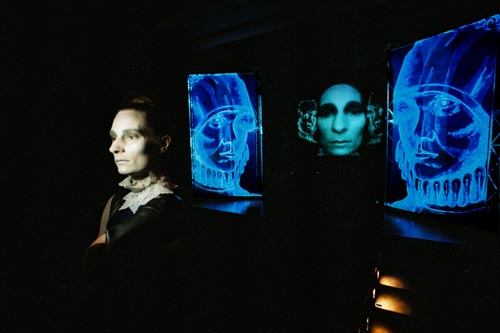ELISION Ensemble | Justine Cooper | John Rodgers
Introduction | Artist's statements | Song texts | Press | Performances | Trailer [20mb mpeg4 quicktime]

Deborah Kayser (soprano) amongst the audience, turning
the live surveillance camera on herself.
photo: Alex Craig
![]()

The body is both a material object and a social construct. While the
body public is a body on display, or a collective. In TULP: The
Body Public we look at these bodies through a lens of medical science
along with the act of inspection and introspection. In the interviews,
instead of searching for proof, we collected experiences. These slivers
of narratives, sutured back together, form a prism of what it means to
be human. The imagery is inspired by historical anatomical illustration,
microscopic cellular structure, modern medical imaging technologies, and
the processes of decay and transformation. In the performance, as in all
things, the beauty and the abject must ultimately coexist.
– Justine
Cooper
Songs from the early Venetian Baroque both assert and question our attachment
to the fleshy, corruptible vessels we ride in for such a brief time. Voices
of the public speak, at first suspended in a gurgle of ultrasound, and
occasionally a dog barks in the background. A cello is prepared and operated
on, but it's more like a rack in a medieval torture chamber than a contemporary
hospital as the narrating voice states. The highly trained aparatus of
the classical musician suggest the trusted and skilled hands of the surgeon.
A bass saxophone is played while pushed through a latex panel like an
internal growth pushing through skin demanding attention while an old
sackbut bell searches a latex surface like a giant stethoscope seeking
information. An early baroque tuning is explored using feedback-like sine
tones that oscillate, pulse, throb and beat and finally merge with pure
sopranino recorder multiphonics. A Monteverdi madrigal decays beyond recognition
and the breaths of the vocalist and the recorder player grow ever longer
and hover improbably in the air.
– John Rodgers